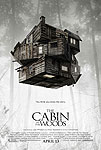The Cabin In The Woods (spoiler free!)
Published on April 16th, 2012 in: Current Faves, Horror, Movie Reviews, Movies, Reviews |By Lisa Anderson

Do you love the horror genre, but feel like it’s in a rut? Do you like rooting for main characters in a terrifying situation, but find that in recent movies, they’re often one-dimensional or unlikable? Do you enjoy the exquisite treat of being confronted with a Big Bad that’s been built up for over an hour . . . but wish that could happen without a lot of sexism or torture porn?
If, so, fortunately, Joss Whedon agrees with you.
Whedon collaborated with former Buffy the Vampire Slayer and Angel writer Drew Goddard to create The Cabin in the Woods. This film was finally released on Friday, April 13 of this year, after having languished since 2009 due to production disputes and bankruptcy issues within MGM’s Lionsgate division. This “very loving hate letter” to the horror genre had the tailwind of good buzz behind it, after having absolutely killed (pun intended) as one of the opening films of the SXSW festival. It also came with a dire (but comical) warning against spoiling the film . . . so I won’t.
As you may have heard, even from spoiler-free reviews, the film starts with a classic premise: five college students retreat to an isolated cabin in the woods, and horror and mayhem ensure. The characters all represent classic horror-movie protagonist archetypes, without fitting their roles perfectly. Similarly, Whedon and Goddard manage to both evoke and play with the tropes of horror movies, without hitting the audience of the head with either the homage or the subversion.
You don’t have to be a fan of the horror genre to enjoy this movie, although it helps to be prepared to embrace some of the genre’s conventions. On many occasions, the camera cuts discreetly away from the gore, but toward the end, there’s quite a bit of gore that’s played for laughs. There’s also a lot of humor—by turns wry and absurd—as well as multiple cultural references, all of which will appeal to Whedon fans and pop culture aficionados in general.
The film owes a lot to Buffy, Angel, and Dollhouse, in terms of concepts and aesthetics, but still manages to feel like it’s own thing. As a Whedon fan, it was great to see Dollhouse’s Fran Kranz again, especially in such an endearing and pivotal role. The presence of Chris Hemsworth allowed me a bit of early anticipation for The Avengers, too; he has a consistent wholesomeness and likeability that are starting to win me over.
Most of all, though, The Cabin in the Woods has layers. You may have guessed from the trailer that there was more to it than the familiar premise, but to paraphrase a joke from Dr. Horrible’s Sing-a-Long Blog, there’s a third, even deeper layer that’s a lot like the first . . . like pie. You may have heard about the much-vaunted twist at the end, but you will not guess what it is. (This is part of what makes Cabin hold up so well on repeat viewings: the little hints that don’t seem to have meaning the first time through.) There is also a super-cool cameo that has stayed mostly under wraps, and will please movie buffs of all stripes.
Much has been made of how simultaneously genre-subverting and genre-revitalizing The Cabin in the Woods is, but that’s not the only interesting thing about it. It deals with themes of youth and sacrifice and freedom and control, of information and manipulation. It’s true, these issue are addressed by The Hunger Games and other works, including many of Whedon’s own projects. Unlike many treatments of these concepts, however, The Cabin in the Woods touches a vein of futility and resignation that I think resonates with the current mood. It is remarkable that it managed to do this even though it was finished years before it was known how sluggish the economic recovery would be, how last year’s worldwide protest movements would fall short of their goals, or how disappointed voters in both major US parties would be in their options for President. It’s even more remarkable that it manages to do this without lapsing into nihilism, or being cynical about its characters or their choices.
Whedon is correct: For maximum enjoyment of The Cabin in the Woods, avoid specific spoilers as much as possible. I will look forward to when that moratorium on spoilers is over, so that academics and fans can begin hashing over this rich text. At the same time, the film can be enjoyed on its own, as a highly creative, well-crafted, action-packed good time.
Time limit is exhausted. Please reload the CAPTCHA.